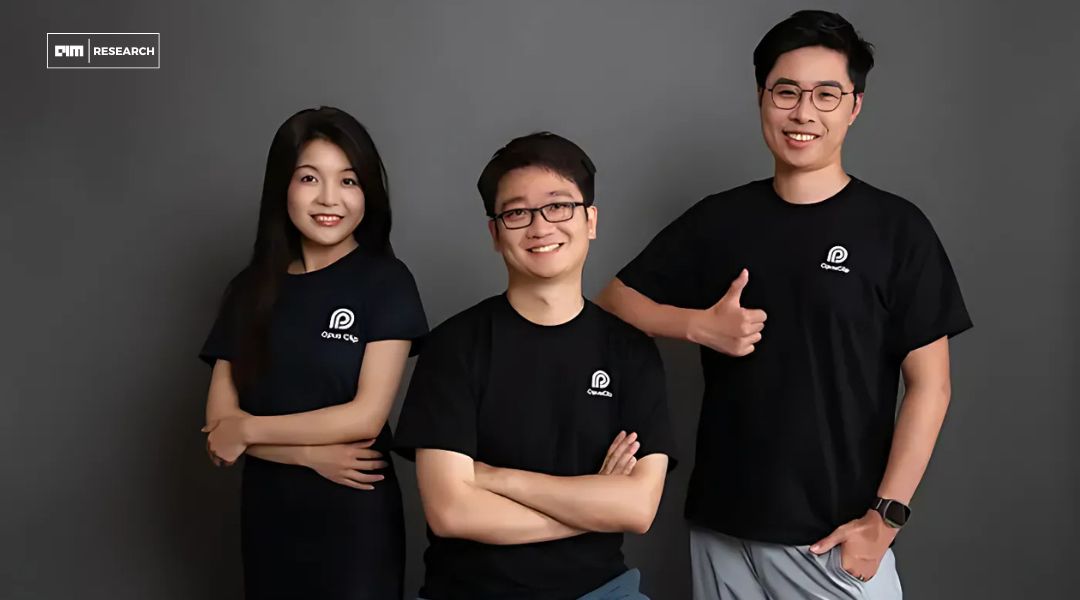
OpusClip Raised $20M by Being the Cool Product That Saves Time and Makes Money
- By Anshika Mathews
- Published on
There must be an AI solution that can automate as much as possible and remove the pain of content creation.


OpusClip’s journey began with a realization: the demand for short-form video content was exploding, yet the process of creating and editing videos remained a daunting, time-consuming task. The startup’s founders, Young Zhao, Jay Wu, and Grace Wang, had already experienced the challenges of content creation firsthand while running a 500-person social media talent agency. They saw how many creators struggled with editing tools and how the demand for video content far exceeded the supply. Their goal was clear which was democratize video creation through AI.
The San Francisco-based company has now secured a $20 million strategic funding round led by SoftBank Vision Fund 2, with participation from existing investors DCM Ventures, AIGrant, and Millennium New Horizons. This brings OpusClip’s total funding to $50 million, enabling the startup to expand its team and invest further in AI research. The funding follows a year of rapid growth, with OpusClip surpassing 10 million creators who have generated more than 172 million clips, collectively amassing over 57 billion views. The company’s AI-powered platform extracts highlights from long-form videos and automatically generates short clips optimized for platforms such as TikTok, YouTube Shorts, and Instagram Reels.
Young Zhao, co-founder and CEO of OpusClip, emphasized the company’s vision: “OpusClip was born from the idea that AI should empower creativity, not replace it. Over the past year, we’ve seen incredible adoption, with millions of creators and businesses leveraging our technology to make video creation faster, smarter, and more impactful. This new funding enables us to push the boundaries of AI-driven video editing even further.”
SoftBank’s investment in OpusClip is not a surprise. The firm has been aggressively capitalizing on the AI boom, with discussions to lead new investments in OpenAI. In January, SoftBank CEO Masayoshi Son announced that the company would participate in a $500 billion investment in U.S. AI infrastructure. Dennis Chang, Managing Partner of SoftBank Investment Advisers, underscored OpusClip’s strong trajectory: “The OpusClip team has demonstrated an incredible ability to build products that resonate with millions of brands and creators. This vision has fueled strong growth, and we’re pleased to support their mission to transform video editing from a manual, time-consuming process into an instant, AI-powered experience.”
OpusClip’s platform offers a multimodal AI-powered video editing tool that allows users to extract key moments from any video using natural language prompts. The system analyzes video content, cross-referencing it with social media trends to determine the most compelling moments to clip. It enhances videos with AI-generated captions, AI reframing, AI audio cleaning, and AI-populated B-roll. The platform also includes OpusSearch, an AI video search tool that enables professional creators and media companies to search their entire video libraries and receive auto-suggested clips aligned with trending content.
Major brands and top content creators have already adopted OpusClip, including Univision, Billboard, iHeartMedia, Visa, LinkedIn, Jubilee, and Grant Cardone. Tom Bilyeu, CEO of Impact Theory, described the impact of OpusClip’s AI: “OpusClip’s AI tool is changing everything. It isn’t just for media companies – it’s for any business owner who needs to maintain a social presence without sacrificing hours for video editing.”
The company operates on a subscription model, with pricing starting at $19 per month for a starter plan and $29 for a pro plan. Users can also purchase additional AI processing credits, and OpusClip has begun developing a business-to-business payment model for enterprise clients.
For Zhao, the success of OpusClip is the culmination of lessons learned from past entrepreneurial ventures. His first startup, Sober, attempted to introduce disappearing social content just before Snapchat’s rise, but it failed within a year. “The failure of Sober really hammered home the importance of timing and having a truly unique offering. We shared a very similar concept with Snapchat, and the company failed within a year. This taught me that a product needs a distinct advantage, and you have to be acutely aware of the competitive landscape.”
Zhao’s attempt to bring the Toast business model to China also provided crucial insights. The approach failed due to fundamental differences in the local market, teaching him that copying a successful U.S. model wasn’t enough. “However, it didn’t really turn out well because of the completely different landscape and ecosystem. But throughout the journey, we realized we were actually the helper for the local restaurant and should not only build software but also provide services whenever needed.”
His time running a food review talent agency gave him a direct understanding of creators’ pain points. “I saw talented individuals leaving to become solopreneurs because they wanted to create for themselves, not just for local restaurants. Instead of managing these creatives directly in my team, why don’t I build an AI-powered product that can enable all of the creators? There must be an AI solution that can automate as much as possible and remove the pain of content creation.”
OpusClip itself was born out of an unexpected pivot. Initially, Zhao’s team built an AI-powered live streaming tool with features such as AI-generated memes and AI-driven interactions. Despite the advanced capabilities, the tool failed to solve a critical problem, gathering only 200 users in three months. “It was not solving any real pain points. So after three months of the launch, we only gathered about 200 users.”
However, one feature unexpectedly stood out: the clipping tool. Users repeatedly requested access to it separately, realizing its potential for repurposing content. “Users kept asking, ‘How can I only use this feature?’ because they wanted to repurpose content for distribution. That overwhelming demand led us to turn the clipping feature into a standalone product. In just two weeks, tens of thousands of users signed up for OpusClip.”
The early traction validated the product-market fit. “Users were saying, ‘I want to pay to jump the queue. I want to pay for a higher resolution. I want to pay for more downloads and credits.’ That’s when we knew we had found product-market fit.”
As OpusClip scales with the latest funding, the company is actively hiring top AI talent and deepening partnerships with Google, OpenAI, and industry leaders. Zhao sees a clear opportunity for OpusClip in the expanding AI video market. “Social media is the largest pool where you can find videos, and we are growing fast—18 months after launch, we’ve gathered 10 million users who have created over 70 million videos on our platform.”
📣 Want to advertise in AIM Research? Book here >
Cypher 2024
21-22 Nov 2024, Santa Clara Convention Center, CA
A Vendor Briefing is a research tool for our industry analysts, and an opportunity for a vendor to present its products, services and business strategies to analysts who cover the vendor specifically or a related technology or market.
AIM Research encourages technology vendors and agencies to brief our team for PeMa Quadrants, when introducing a new product, changing a business model, or forming a partnership, merger, or acquisition.


